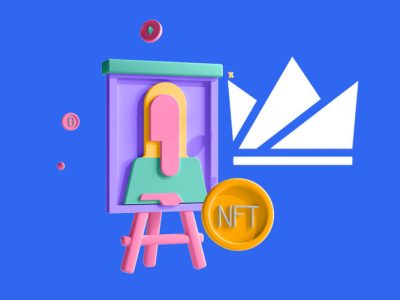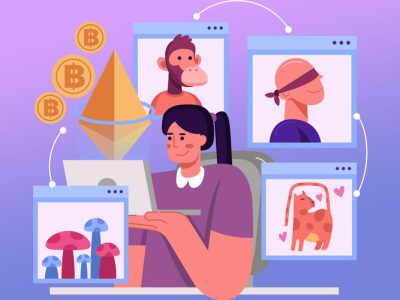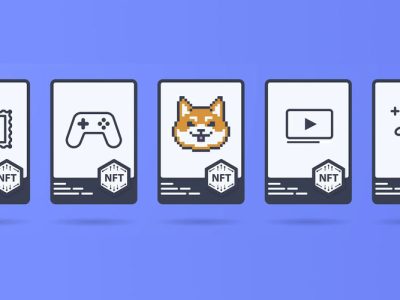Nearly anything can be represented digitally using non-fungible tokens (NFTs), including films, event tickets, and virtual properties. Digital art is still possibly the most well-known NFT use case. Many online markets let aspiring digital artists to sell their creations, which raises interest in NFT art among more people. Here are some pointers for turning your artwork into a digital asset that can be sold on websites like the Binance NFT Marketplace.
NFTs are a distinct category of digital assets that can represent both digital and physical objects. Each NFT may be distinguished from one another thanks to their distinct token IDs. NFTs are not interchangeable with one another, in contrast to Bitcoin and other fungible assets.
You should definitely read this: All you should know about WOOFi (WOO)
Artists that make and sell their art in the form of NFTs can profit from the special characteristics of NFTs. In addition to making it simple to demonstrate ownership and authenticity, NFTs make it easier for artists to receive royalties without the aid of an agency or management.
What is NFT art?
Digital representations of distinctive assets called NFTs can be used to show ownership. Consider them like electronic fingerprints for real valuables. The metadata of the NFT can be used to contain specific information, such as your signature. Any digital form of art is considered NFT art. A GIF, video, sound effect, piece of art, music, or a combination of any of these can be used.
NFTs can even develop from memes. The fungible token Bitcoin is one of the most well-known types of crypto asset. NFTs are completely unique and cannot be exchanged for interchangeable tokens because they are non-fungible. The NFT art market differs from conventional art sales in that it doesn’t entail the purchasing and selling of tangible goods. The NFT will exist in a digital wallet on a particular blockchain as a digital item.
NFT can be used by artists as a technique to validate their work and increase ownership rights. Additionally, by certifying the artwork as NFT, you effectively transfer ownership of the original copy to the buyer. NFTs are intriguing since you may program in royalties to get a share of sales after every upcoming sale on the secondary market.
Why do people become NFT artists?
NFT art is created digitally, therefore displays are no longer limited to certain locations like museums and art galleries, allowing artists to display their works anywhere in the world. This may make it possible for artistic creations to be recognized globally across borders.
Another crucial justification for producing art using NFTs is that you can quickly confirm its validity. This is in addition to experimenting with a contemporary, new art format. The ownership and originality of every NFT artwork may be safeguarded thanks to the distinctive ID of each piece and the immutability of the blockchain.
NFT artists would also be happy to hear that their artwork may be displayed and sold directly, saving them from middlemen fees that can frequently eat into their earnings.
Artists can get passive revenue through royalty payments on some platforms, such Binance NFT Marketplace. This means that even when an NFT is sold between users on the secondary market, its inventors can still profit from it.
Finally, the NFT art scene has the appeal of allowing anyone to produce and market their work. Many NFT marketplaces are inclusive, in contrast to conventional art exhibitions. The opportunity to be independent and support themselves via their passion is provided by this atmosphere for aspiring artists.
Downsides of being an NFT artist
Despite growing in acceptance, NFTs are still not regarded as a widely practiced art form. Established NFT artists might not find enthusiastic clients as soon as traditional buyers from art galleries because it’s still early in the market.
Furthermore, since anybody may create NFT, the market where you want to sell your artwork might be more crowded than a hand-selected art gallery with a limited selection. To improve your chances of being a successful NFT artist, you might need to develop your fan following and establish the worth of your work.
How to be an NFT artist?
In order to become an NFT artist you should:
1. be able to find the right marketplace
To buy and sell your NFT paintings, you need to be aware of the best market. You can purchase, sell, and exchange NFT art with a large audience if you use the correct platform.
Good choices include Rarible, Verisart, and OpenSea. This is how much developing an NFT marketplace will set you back if you want to create your own.
2. Know how to market your NFT
Instead of solely relying on online markets, promote yourself effectively through social media channels to establish a solid reputation, engage potential buyers, and raise awareness of your work. Not everything is about minting.
3. Build Connections
The NFT art market is driven by other artists, therefore networking will be extremely beneficial to you. Share content from other artists on a regular basis, and they’ll start doing the same for you, which will help you establish yourself as an NFT artist.
4. Choose the Right Blockchain
Despite the fact that Ethereum provides a streamlined experience, it is the obvious winner when it comes to NFT artists. Be mindful of your many alternative choices, which include Polygon, Solana, Cardano, Tezos, Wax, Flow, Bitcoin Cash, Klaytn, and others.
5. Create Your Crypto Wallet
To produce, sell, hold, and transmit NFT art to others, you will need a cryptocurrency wallet. There are other choices, but MetaMask is by far the most popular. Its Chrome extension is accessible too.
6. Choose the Right Currency or Tokens to Store in Your Crypto Wallet
The next step after setting up your cryptocurrency wallet is to load it with the cryptocurrency that works with the blockchain of your choice. For instance, if you selected Polygon, you would require MATIC tokens, and if you selected Ethereum, you would require ETH.
7. Decide On Your Prices
It is time for you to choose your selling price after your NFT painting is prepared for public viewing. How much you decide to charge for your artwork solely relies on you.
See what other artists are charging for their works by conducting some competitive analysis. That will assist you in setting the cost. It is best to not demand a big charge because this will be your first NFT.
8. sell your NFT art
When your first NFT artwork is prepared for sale, you must decide which marketplace is best for your collection. There are several different NFT marketplaces to pick from, and each has advantages and disadvantages. Furthermore, as the field of NFTs and NFT art develops, new markets will soon materialize.
9. Build up an art network for more authenticity
Networking is always effective. Engage other NFT artists in conversation. Genuinely acknowledge excellent work, and promote excellent work on your social media. They would repay the favor by sharing your work in their area, increasing your exposure to pertinent audiences.
Conclusion
The sale of cryptocurrency or non-traditional forms of art has the potential to revolutionize the whole creative sector; its emergence is just the start of something that will seem commonplace to future generations. However, the early NFT art scene falls short of standing up as a trustworthy, welcoming platform to sell digital art over. Our fingers are crossed that the tide will flip in favor of designers as we keep a close eye on what transpires next.




